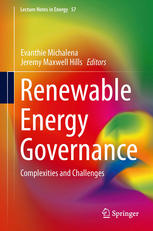

Most ebook files are in PDF format, so you can easily read them using various software such as Foxit Reader or directly on the Google Chrome browser.
Some ebook files are released by publishers in other formats such as .awz, .mobi, .epub, .fb2, etc. You may need to install specific software to read these formats on mobile/PC, such as Calibre.
Please read the tutorial at this link: https://ebookbell.com/faq
We offer FREE conversion to the popular formats you request; however, this may take some time. Therefore, right after payment, please email us, and we will try to provide the service as quickly as possible.
For some exceptional file formats or broken links (if any), please refrain from opening any disputes. Instead, email us first, and we will try to assist within a maximum of 6 hours.
EbookBell Team

4.0
76 reviewsThis book focuses on Renewable Energy (RE) governance - the institutions, plans, policies and stakeholders that are involved in RE implementation - and the complexities and challenges associated with this much discussed energy area. Whilst RE technologies have advanced and become cheaper, governance schemes rarely support those technologies in an efficient and cost-effective way.
To illustrate the problem, global case-studies delicately demonstrate successes and failures of renewable energy governance. RE here is considered from a number of perspectives: as a regional geopolitical agent, as a tool to meet national RE targets and as a promoter of local development. The book considers daring insights on RE transitions, governmental policies as well as financial tools, such as Feed-in-Tariffs; along with their inefficiencies and costs. This comprehensive probing of RE concludes with a treatment of what we call the “Mega-What” question - who is benefitting the most from RE and how society can get the best deal?
After reading this book, the reader will have been in contact with all aspects of RE governance and be closer to the pulse of RE mechanisms. The reader should also be able to contribute more critically to the dialogue about RE rather than just reinforce the well-worn adage that “RE is a good thing to happen”.